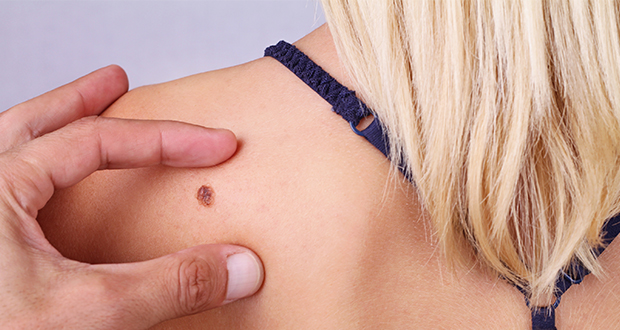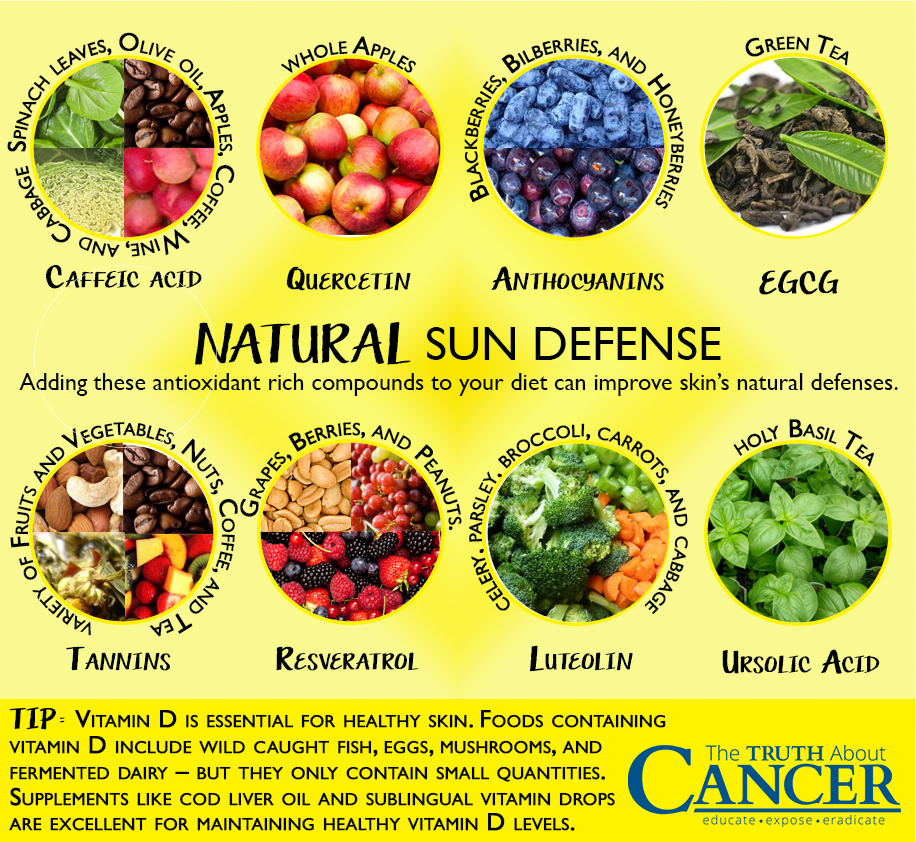By Dr. David Jockers DC, MS, CSCS

Seeking natural remedies to prevent and treat skin damage is increasingly popular for skin cancer prevention. Roughly 60% of chemo-therapeutic drugs on the market are designed to mimic the roles of natural plant based compounds. This begs the question: is treatment for the disease found without a prescription?
The month of May is Skin Cancer Awareness month and the mainstream media will be focused on healthy sun habits and getting dermatological exams. While some of this advice may be useful, there is very little discussion of nutrition and lifestyle in relation to melanoma skin cancer prevention. This article provides key research-based insights on lifestyle factors that influence the development of melanoma skin cancer and compounds and strategies to prevent it.
Plants Fight Skin Cancer
Phenolic compounds in plants contain anti-carcinogenic potential. Flavonols, lignins, stilbenes, and phenolic acids are synthesized by the plant to protect against the sun’s rays, chemicals, pathogens, pests, and are used to repair injury. These compounds not only protect the plant for survival, but consuming plants rich in phenolic compounds can also protect you from skin cancer.
Change your Diet and Protect Your Skin
Naturally occurring phenolic compounds in food are more readily available to the body for use than synthetic compounds found in many supplements. Plants exhibit skin cancer prevention in the
following ways: - Scavenge free radicals and inhibit toxic compounds which promote genetic damage and mutations
- Prevent inflammation and controls natural homeostatic mechanisms for healthy hormone function
- Act as bodyguards against other antioxidant activity
- Assist in detoxification pathways for proper vitamin D absorption and removal of toxins
- Protects skin integrity and prevents aging
Compounds That Help Protect Against Melanoma Skin Cancer
Adding these antioxidant rich compounds to your diet can improve your skin’s natural defenses:
Caffeic Acid: Found in spinach leaves, olive oil, apples, coffee, wine, and cabbage
Tannins: Contained in a variety of fruits and vegetables, nuts, coffee, and tea
Resveratrol: This type of stilbene is found in grapes, berries, and peanuts. Resveratrol helps to inhibit the over-production of melanin
Anthocyanins: Eat blackberries, bilberries, and honeyberries
EGCG: Epigallocatechin-3-gallate (EGCG) has an anti-proliferative effect on cancer cells. Green tea is a rich source of this cancer fighting compound
Quercetin: Protects against genetic alterations leading to irreversible carcinogenesis. Eating whole apples, including their skin, helps protect against harmful UV damage
Ursolic Acid: Holy basil tea contains ursolic acid which shuts down cancer growth and down-regulates the genes associated with cancer growth
Luteolin: A major anticancer flavonoid, luteolin is found in medicinal herbs like chrysanthemum flowers, as well as in fruits and vegetables including celery, parsley, broccoli, carrots, and cabbage
Use Plants for Topical Skin Healing
Plants offer an economical and effective way to improve a variety of skin problems such as sunburns, open wounds, and infections. Try the following natural remedies next time you find yourself in need of providing skin pain relief:
- Massage a few drops of flax oil over cuts and burns for improved skin regeneration.
- Cleanse a skin infection by swabbing honey onto the affected area for natural antimicrobial results.
- Use Poly Herbal Cream containing plant extracts to heal from burns and wounds.
- Apply citrus essential oils such as lemon to reduce pain and inflammation, eliminate scars, and improve circulation to wounds. Other oils such as oak wood, mate leaf, sappan wood, and Populus nigra are effective agents for skin repair.
Vitamin D for Skin Cancer Prevention
Vitamin D exposure is critical to the function of an endless number of life-essential processes. Vitamin D deficiency has been linked to a variety of skin ailments including psoriasis, dermatitis, scleroderma, and vitiligo which is a disease resulting in the loss of patches of skin pigmentation. Vitamin D is essential for healthy skin by promoting DNA repair, hormone responses with anti-carcinogenic abilities, and stimulating enzymes required for melanin production.
Safe Sun Exposure is Essential
Don’t stay indoors because you are afraid of developing skin cancer. A natural reaction in the skin takes place when exposed to sunlight. It is the UVB (ultraviolet B) rays which are required for this reaction but unfortunately is also associated with skin cancers such as melanoma.
To avoid over exposure to the sun, researchers recommend receiving 8-24 minutes of natural sunlight to arms and legs daily without sunscreen treatment. Timeframe of safe sun exposure will vary by individual and can increase depending on cloud coverage. On a clear sunny day, 15 minutes of sun exposure on the skin produces 2,000 to 4,000 IU of vitamin D for the body.
Groups at a higher risk of over-sun exposure and increased risk of skin cancer include post-menopausal women, Caucasians, individuals at higher altitudes, and people who frequent the tanning bed. Proper vitamin D synthesis is not possible from artificial light forms such as tanning beds.
Supplementing with Vitamin D3
When the region where you live or weather conditions prevent the sun’s rays from breaking through the clouds, vitamin D3 supplementation is ideal. Vitamin D3 is the active form of vitamin D and regulates the vitamin D nuclear receptor (VDR) for proper immune support.
Foods containing vitamin D include wild caught fish, eggs, mushrooms, and fermented dairy − but they only contain small quantities. Supplements like cod liver oil and sublingual vitamin drops and sprays are excellent strategies for maintaining healthy vitamin D levels.
Can the Wrong Sunscreen Cause Skin Cancer?
Our bodies are constantly burdened by chemicals in our environment. Even the “protective” sunscreens we slather ourselves with contain skin damaging toxins.
Titanium dioxide gives sunscreen its white appearance and is a microscopic metal that binds with impurities. Studies do not definitively conclude that titanium dioxide exposure to skin cells causes immediate cell damage but suggest that titanium dioxide creates cellular changes and possibly abnormalities from long term exposure. This metal does cause an increase of inflammatory gene expression suggesting it is not as safe as retailers would like you to assume.
Another common toxin which promotes cancer growth is BPA (bisphenol A). BPA is an environmental toxin found in the water you are drinking from plastic bottles and contaminated food microwaved in plastic containers. Both the kidneys and liver aid in removing BPA from the body and are regularly exposed to toxic chemicals. Avoiding all use of plastic materials, especially for food and water storage, can limit your exposure to such carcinogens.
Detoxify Your Liver & Kidneys to Lower Cancer Risk
Along with the skin, the liver and kidneys are also major organs involved in converting vitamin D from sunlight and food. Vitamin D deficiency can result when toxic waste accumulates in these organs preventing its absorption and requiring detoxification.
Milk thistle contains a detoxifying agent known as silymarin. Silymarin promotes liver and kidney function and flushes toxins from the gastrointestinal tract. Preventing skin cancer growth is as safe and enjoyable as sipping on milk thistle tea. Also consider taking a supplement containing 200mg of milk thistle daily to cleanse your organs of environmental hazards.
Article Summary
May is Skin Cancer Detection and Prevention Month. While some of the mainstream advice may be useful, there is very little discussion of nutrition and lifestyle in relation to skin cancer. There are lifestyle factors that influence the development of melanoma skin cancer and compounds and strategies to prevent it.
Certain compounds in plants protect them against the sun. Consuming plants rich in phenolic compounds can also help protect you from skin cancer.
Adding these antioxidant rich compounds to your diet can improve your skin’s natural defenses:
Caffeic Acid: Found in spinach leaves, olive oil, apples, coffee, wine, and cabbage
Tannins: Contained in a variety of fruits and vegetables, nuts, coffee, and tea
Resveratrol: Found in grapes, berries, and peanuts
Anthocyanins: Eat blackberries, bilberries, and honeyberries
EGCG: Green tea is a rich source
Quercetin: Eating whole apples, including their skin, helps protect against harmful UV damage
Ursolic Acid: Holy basil tea
Luteolin: Found in medicinal herbs like chrysanthemum flowers, as well as in fruits and vegetables including celery, parsley, broccoli, carrots, and cabbage
Vitamin D is essential for healthy skin by promoting DNA repair, hormone responses with anti-carcinogenic abilities, and stimulating enzymes required for melanin production.
When the region where you live or weather conditions prevent the sun’s rays from breaking through the clouds, vitamin D3 supplementation is beneficial.
Milk thistle contains a detoxifying agent known as silymarin which promotes liver and kidney function. Consider sipping on milk thistle tea or taking a supplement containing 200mg of milk thistle daily to cleanse your organs of environmental hazards.

No hay comentarios:
Publicar un comentario